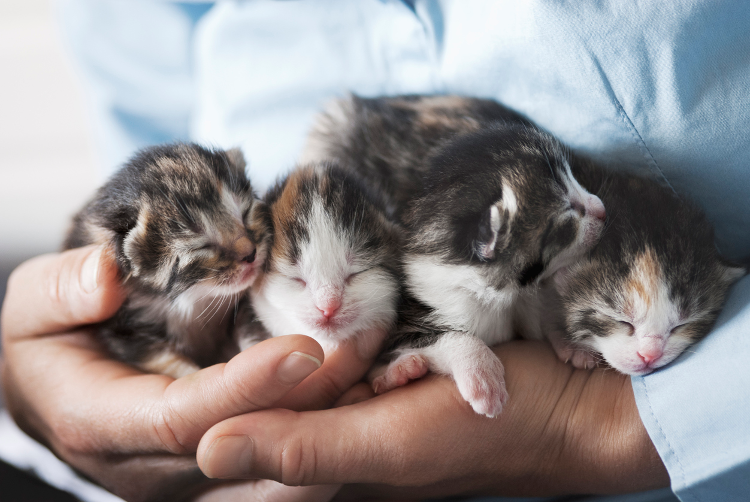We all know how necessary it is to get your cat or dog spayed or neutered, right? But what to do with a cat who’s already pregnant? The first time I found a preggo street kitty, my instinct was to take her to the shelter. I knew of a great no-kill place that I thought would be perfect for her, as I was unable to care for her at the time. Years now down the road, I’ve come to find out that surrendering a pregnant animal will result in the termination of the pregnancy. Sigh. But don’t worry! If you find yourself the caretaker of a pregnant cat, there are many ways you can help.
Kitten Gestation
A few years ago, when I found my sweet girl Lula, she was SUPER pregnant, and I got to live out my lifelong dream of being a KITTY MIDWIFE, awe yes. Cat pregnancies last for an average of 64 to 67 days, and when she waddled up to me on the street, she was ready to pop, so to speak. To see if your cat is pregnant, gently feel around her stomach area. If she is with kitten, you’ll feel that her stomach is a bit hard and distended.
This is going to sound totally weird, but pregnant cats also have a very faint smell about them. I can’t quite describe what it smells like, but if you notice an unusual odor, that may be an indication of pregnancy. If you’ve got a pregnant cat on your hands, your top priority should be to make sure that she feels safe and comfortable.
Interestingly, the hormonal changes that a pregnant cat experiences will cause her to be much more affectionate towards strangers, so this may be easier than you think. What I did was put a pillow inside of a plastic drawer to make a little bed for her, but a cardboard box and an old blanket or towel will work too. Cats feel safe in enclosed spaces, so this is essential in making sure your mom-to-be feels comfortable. For most of the gestation period, you can pretty much feel free to sit back and relax, make sure mom has fresh water and lots of food, and wait.
Birth
You’ll know when your pregnant cat is going into labor when she starts to pace, or otherwise act strangely. When Lula was ready to give birth, she came up to me and started frantically licking my forehead! Not sure what that was about, but you’ll know by your cat’s attitude that something is up. She may also start howling, and, much like humans, her water may “break”, though not necessarily. For the most part, cats have the birthing process pretty much figured out, but you do have one very crucial job – make sure the mother cat licks ALL of her babies completely clean.
Some cats can have very large litters, and sometimes a mother cat may not even keep track of how many babies she’s given birth to! (Are you exhausted yet?) Kittens are born still inside their amniotic sac, and if the mother doesn’t remove this sac quickly enough by licking it away, it is possible for the kitten to suffocate.
Curious about how many kittens you’ll be expecting? Unlike humans, cats have two uteruses, which can carry a good many embryos. Litter size can vary greatly, and relies on many factors such as the age and health of your cat. Young mothers will usually have smaller litters, while older cats who have had kittens in the past will usually have larger litters, though at a certain age a cat’s litter size will start to decrease. The more litters a cat has had, the bigger the litter sizes will be. As for Lula, she had two sweet boys and two rambunctious girls!
God Save The Queen
Fun fact – did you know that mother cats are called Queens? Obviously! Now that your wee little baby queen has given birth to her litter and has cleaned them all up, prepare a new box with clean towels. Let your cat and her kittens rest for a while, and in a few days time, try to encourage your cat to move into the new box with her kittens. As for the old box – it’s probably best to dispose of it completely.
As for the postnatal care, your queen has it covered! Make sure she is spending as much time as possible with her kittens, and caring for them. (Licking them, feeding them, sleeping with them). If a mother cat is not doing any of these things, it’s possible that she is rejecting them. Like, as if there couldn’t be anything more heart wrenching than rejecting a newborn kitten. I know. With something akin to postpartum depression, some cats will either reject their litter completely or take the time to “warm up” to their new babies. If this is so, it is your job to do the mothering for them, until the queen is ready or until the kitten can take care of itself. Keeping the kitten warm, safe, and fed are a few basic necessities needed to care for a newborn kitten.
For many cats, motherhood comes naturally. But for some, especially young cat mothers, it can be a bit difficult. Make sure you are always alert during the first few weeks of your new life as a cat grandparent, and you, your cat, and your new grandbabies will get along just fine. And for that, congratulations!







Thankyou, I just want to give kudos for this article you’ve written.
Pregnant Cat: What To Expect When You’re Expecting Kittens
It was helpful to me, as I await my Queen to have her kittens.
Your article was well written, informative, and gave me a dew giggles too.
Cheers